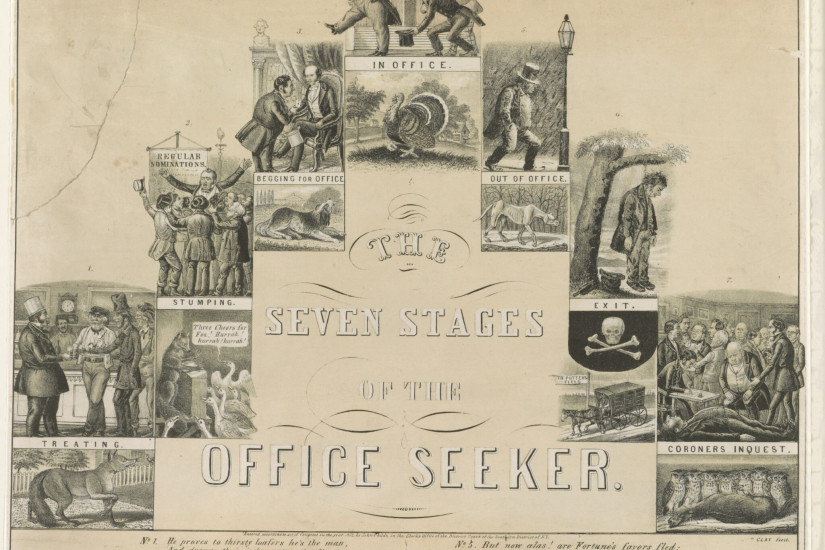American politics during the 1840s and 1850s was party politics. But the parties themselves were fueled by spoils—the quest for patronage. Edward W. Clay once satirized the spoilsman’s climb to power in “The Seven Stages of the Office Seeker.” The political cartoon follows the rhythms of Nathaniel Currier’s temperance propaganda, “The Drunkard’s Progress.” In Clay’s version, advancing up the party ladder required foxlike skills of servility: plying voters with liquor, food, and flattery; stumping energetically on behalf of a party ticket; and then, like a dog, begging for favor at the feet of party leaders.
The summit attained in Clay’s cartoon is glorious, symbolized by the strutting turkey. But removal invariably follows, represented by the avatar of a famished stray dog cast to the streets. A “coroner’s inquest” by the curious public examines the untimely cause of political death. In the final stage, the officeholder’s body is driven to a potter’s field. The spoilsman is discarded and forgotten. Party politics is a system, however, rather than the behavior of an individual, like Currier’s drunkard. The churn of public approbation invariably moves on to the next person. Fittingly, they, too, are destined to be a victim of party abuse.
While some antebellum politicians did enjoy lengthy careers, two diplomats from Indiana’s First Congressional District, George H. Proffit and Robert Dale Owen, fit Edward Clay’s satirical arc remarkably well. Southwestern Indiana was an unlikely wellspring of diplomatic talent. The district spanned a region of the state called the Pocket. A narrow strip of counties located snugly between the Wabash and Ohio Rivers, the name took hold after the U.S. Congress carved Illinois out of Indiana Territory.
George H. Proffit served in the U.S. House from this seat from 1839 to 1843. A Whig merchant posted to Brazil by President John Tyler between December 1843 and August 1844, his sojourn was cut short by feuds stemming from presidential succession and party dissensus. Robert Dale Owen, an agrarian Democrat, succeeded Proffit in office for two terms in the U.S. House, after which he was sent to the Kingdom of the Two Sicilies in 1855 by Franklin Pierce. By the time Owen returned home in 1858, he found himself an outcast within his own party as a unionist with antislavery inclinations trapped within the party of secession.
